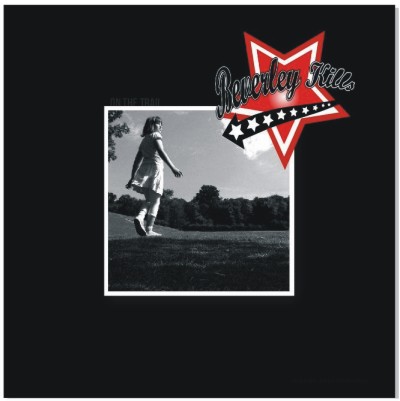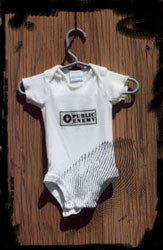|
The Pit and the Pendulum:
Notes on setting up an indie record label
The success of our recent Horse Party singles and
the Bury St Edmunds album has made R*E*P*E*A*T feel like a real record
label.

Packing up and mailing out orders, being interviewed
by the media, employing PRs, reading reviews, hearing our stuff on the
radio, 'This is The Sound of Sugar Town' has kept me out of mischief
for months... and it has all been very exciting and gratifying. The
success of these releases is of course relative (even the album is still
some way off covering costs, for instance), but has been immensely rewarding,
satisfying and cheering – despite whatever front we may put up,
it is always comforting to feel appreciated. It has also lead to several
other bands asking to release stuff on R*E*P*E*A*T, and to others asking
advice about setting up their own labels.
The below is the reply to one such query and deals
with what I have learnt over 20 or so years running what I'd call an
artistically successful but financially challenged indie record label.
Other people no doubt do it completely differently, but this is my truth
(now tell me yours)...
* Do this only because you want to put out bands that you love, to
share their music and to get them to a wider audience, not to make money.
In my experience, it's very unlikely you will cover costs (only one
of my 'proper' shop releases has ever done this) and running a label
will also take up oodles of your time, energy and patience. It's 100
per cent worth it though when, for example, you hear your tracks on
Radio 1, as with the Horse Party single only last night.

* Engage some quality control; comparing some of our mid period compilations
with the recent Bury one (where I had Seymour's opinion too), and the
very early ones (when we didn't know many bands in a position to release
with us but the ones we did know, really were the biz), I see I have
perhaps put out some substandard stuff! Mentioning no names...
* Lots of 'the biz' works on the basis of who knows who, what favours
certain 'in' people do for each other and what exciting 'gifts' you
can provide them with – it came as a rude and brutal shock to me
that, sadly, 'success' is not all about the quality of the music, but
which of the slick slackers in Camden you're prepared to suck up to.
You need to identify the people really into the music and not into the
extra curricular benefits, and get them on your side. On the subject
of little presents for influential people, we recently provided DJs
with Bury St Edmunds tea towls and news paper cuttings on crocheted
wolves... it seemed to work though!
* Be clear with the bands who pays for what and where any profits go;
though I don't normally do any signing of contracts, I do write a clear
email summarising what I think we have agreed, and stating that taking
part in the project means that everyone is happy with these terms.
* Make sure you are clear who holds the copyright of the songs –
with our releases bands hold the copyright of their tracks but we have
copyright of the collection as a whole, so no one could re-release it
exactly as we have, without our permission.

* We used to fill in MCPS forms so that any song writers who belonged
could get their royalties, but now that seems to be done when you upload
tracks ready for digital distribution.
* Song writers in bands may well benefit from joining PRS – they
will then get paid for playing their own songs in a PRS venue, as well
as when other people play or broadcast it. You night want to encourage
them to do this.
* Our distribution (we use Backs / Shellshock) is invaluable. Not only
do they get stuff into shops (or, more likely, arrange for it to be
possible for customers to order stuff in), they also get it to Amazon,
Play etc as well as giving it a push on digital platforms. We chose
them all those years ago because they talk about records as works of
art and not units, and clearly love the stuff we produce.
* MP3 and vinyl seem to be where it's at at the moment. I like Horse
Party's strategy of alternating free download releases with vinyl singles
(which we are now compiling for a CD album).
* Even if your tracks are already mastered, get the whole collection
mastered – and mastering for vinyl is different than mastering
for CD – Sam Marsh of Machismio's is great at this, and very reasonably
priced!
* Bandcamp has worked well for us for the Bury album, although I wouldn't
say even the 'free' version is cheap.
* Though another expense, using a decent PR, who is respected in the
industry, is enthusiastic about your sounds and will work hard, is worthwhile.
I'd not employ anyone who doesn't want to listen to your tracks before
agreeing to work with you. In Cambridge I believe there is Quite Great
PR (who I've never used); we've been using Manilla recently and they've
done us proud. But you don't have to rely on an established company.
One of our previous releases was reviewed in NME (and many other places)
as we got an unemployed friend to hassle them in person every day until
they agreed to give the record a spin! Enthusiasm is more important
than professionalism.

* Extending the above - the personal touch often works best. I've only
recently started using a PR, we got stuff on the radio in the past just
by sending it personally to DJs with personal message and appropriate
little gifts (no sex and drugs in our case); even with a PR, we still
try to send personal messages out ourselves to our most important reviewers,
on top of anything the PR might do.
* Make sure things are easy for journalists – as someone running
a 'zine who also has to go to work, I find it much easier when CDs are
submitted with just a one page of press release, or where digital media
is submitted with some prose that can be pasted onto news pages etc,
if there's not enough time for someone to write a full review. Put a
folder of everything else a reviewer may need (MP3s, press release,
band pix etc) in a folder on Dropbox or similar, where they can look
if they want, rather than bombarding them with it unsolicited.
* Send out review copies at least 6 weeks before release date.
* Make sure bands utilise their own social media, that they remember
to sell copies at gigs, plug the release etc. Try to get them to arrange
at least a few gigs to coincide with the release.
*Good pressing plants:
I'm loving these people for vinyl at the moment
http://www.discmanufacturingservices.com/
tell MD Sam we sent you!
I have often printed the sleeves for 7's myself – that means you
don't need to finalise the design at the same time as submitting the
audio. I print on a rectangle 14” x 7”, fold and put in a
plastic bag. If you use colour card but black and white printing, this
is very cheap but looks professional– I always use David at Cambridge
Printers.
However printing sleeves yourself for 10” or 12” records is
a false economy, as I found out to my cost with the Beverley Kills single.
For Cds production,there's some helpful, local competitive producers
Noisebox http://www.noisebox.co.uk/pages/
SRT http://soundrecording.technology/
Don't forget, we at R*E*P*E*A*T can copy you CDrs at a very cheap rate!
Running R*E*P*E*A*T Records has taken my time, my money and maybe a
portion of my sanity. It has also been one of the best things I have
done in my life, and I am insanely proud of all the releases, even the
slightly dodgy ones. They are all indeed works of art, if, occasionally,
flawed ones. There's not many better bottomless pits to pour your finances
and your energies into; so here's to our new single (a flexi!), albums
and eps...

Rosey R*E*P*E*A*T, November 2015
Hear and buy our sounds on bandcamp here
or direct here and here
Hints on running a PR campaign here

|






